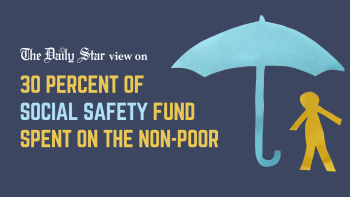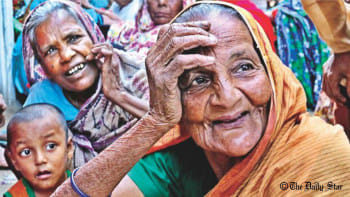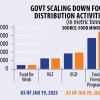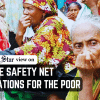Don’t shrink social safety net even during austerity

There is an issue about the accuracy of the social safety net portfolio accounting. Here, items like civil servants' pensions are included within that portfolio. It gives misleading information and it inflates the social protection portfolio more than what it actually is. This misleading accounting problem should be resolved.
Second, we are in a tight budget environment, in which the distributional issue is very important. Who should receive the load of the tight budget? The general people? Or those who can bear the load more, for example? Or should efficiency improvement be the goal, which means reducing the allocation from inefficient or relatively less prioritised expenditure items so that we can allocate more for the general population?
When I am deciding to reduce the budget, where shall I make the cut? Social safety net allocation should not be reduced, and here I am not talking about new resources. I am talking about either cutting expenses or making insignificant expansion. Where would that amount come from? Even in this period of austerity, we have seen that neither the focus on megaprojects have gone down, nor have the non-priority expenditures—such as cars for district commissioners—been curtailed. They are still on the priority list.
So, in the decision about on whom the austerity burden should be imposed, if the size of the social safety net allocation does not increase, or decreases, it is saying that the government is either inattentive or going against the interest of the general people.
Third, a review of the social safety net portfolio is necessary. Not just taking out pension, there are many items that can be re-prioritised with the idea that there are two large missing groups in the current portfolio. One of them is the urban poor, who are inadequately addressed. The other is marginal and excluded population groups. I call them poverty's third frontier because they are like an excluded group within the extreme poor, like tea workers, fishermen, municipal workers, etc. There is an opportunity to increase the allocation for this group. So, when the budget is tight, you can make sure that distributional efficiency is ensured for the people, which does not seem to be happening here. The other thing you can do is ensure efficiency in the reforms. That way, the urgent groups who are left out can get the allocation.
Then there is mistargeting. Even within this limited amount that is available for social protection, instead of those who should receive it, there is significant leakage and mistargeting. Unfortunately, the mistargeting trend may be an upward trend; this is a governance issue and is of great concern. In recent times, due to governance shortfall, this mistargeting rate may have gone up. This needs to be looked into.
Finally, the social safety net is an important sector, particularly for the poor people. The people of our country are vulnerable to shocks. Social safety net has a particular role to reduce the exposure to that vulnerability. As you know, the latest data of Bangladesh Bureau of Statistics says one-fifth of the population are experiencing food insecurity to some degree. So, no matter how tight the budget is, the social safety net sector has to be given its due importance, which means the government needs to stop misleading the accounting, improve efficiency, reduce mistargeting, and address the unaddressed groups.
As told to Tamanna Khan of The Daily Star.
Hossain Zillur Rahman is an economist and political sociologist, and executive chairman of Power and Participation Research Centre (PPRC).
Views expressed in this article are the author's own.
Follow The Daily Star Opinion on Facebook for the latest opinions, commentaries and analyses by experts and professionals. To contribute your article or letter to The Daily Star Opinion, see our guidelines for submission.

 For all latest news, follow The Daily Star's Google News channel.
For all latest news, follow The Daily Star's Google News channel. 










Comments